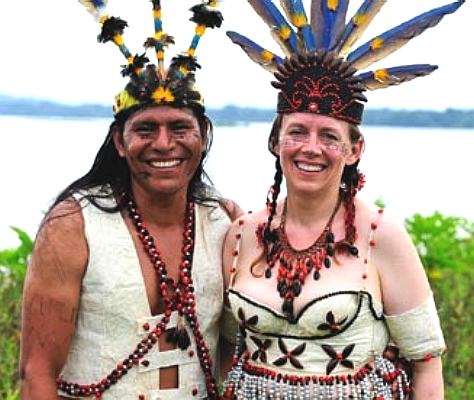|
MARI MUENCH
|
|
|
THE GUARDIAN 13 JANUARY 2013 - ECUADOREAN TRIBE WILL 'DIE FIGHTING' TO DEFEND RAINFOREST
According to many media reports, Kichwa villagers from Sani Isla have vowed to resist oil prospecting by the state-backed Petroamazonas oil exploration company.
The oil company PetroAmazonas is promising my Amazonian Kichwa community a new school, college, eco-lodge, grant funding for their children to go to university, money for healthcare, dentistry, jobs and a cash lump sum, in return for being able develop their land. Surely though, these bribes to modernize are contrary to conservation policies, designed to protect human life in its natural state. Clearly, the Kichwa are happier now and why would anyone want to pressures of modern life, with the financial slavery that that entails. For goodness sake leave these people alone.
Patricio Jipa and his wife Mari Muench have a 14-month-old baby to protect. Patricio has embarked on the task of persuading the community as to the benefits on not ruining the tranquility of what they have – in order to preserve intact the 70,000 hectares of virgin rainforest here, its inhabitants, medicinal plants, flora and fauna.
Patricio says: "A vote by my people is imminent. We are going to go through the rainforest, house to house, to talk to the people to help them choose tourism and rainforest preservation over the offer from the oil firm."
"We have protected these lands with our hearts, soul and lives since before we can remember. In 2009, when I was president of the community, the entire community got together and wrote and signed a document that we hand-delivered to the oil company, staying that we would never give up Sani Isla lands for oil exploitation. This holds firm in indigenous law but they are here now, saying that a change to the Ecuadorian constitution has rendered the document we wrote as worthless – so now we are fair game. We have since found out that this is not true."
"My life changed in 2008 when I met my wife, the woman I had seen in a vision when I was 15. We married in 2010, not an easy path to take for either of us – I am an indigenous Amazonian shaman and community leader from Ecuador whose role is to honour, protect, serve, advise and heal the people, emotionally, physically and spiritually. She, a caring, outgoing entrepreneur from London with an interesting energy and a deep passion to help others – but destiny had spoken. Now, with our daughter we find ourselves in the middle of a fight to protect my ancestral lands, the virgin rainforests of Ecuador from oil exploitation."
"The modern world is advancing faster than we as a people can cope with, but we know that education is key and there is a need for money too. Life has changed. Even in the rainforest we now need money for schooling and to sustain ourselves to start projects such as an organic fruit farm."
"We built a lodge on the edge of a beautiful lagoon to bring in tourism, and it does, and we are grateful for everyone who has visited us. But financially it has struggled; my wife's life savings are keeping it going at the moment. It could work though – and we are hoping to attract more tourists from the UK and elsewhere."
"The oil companies have made great in-roads this time, they have found our people at an all-time low emotionally and financially, and have seized their chance. How can we help the community give up such wonderful opportunities?"
"In Quito we sit, making a plan and have asked our friends and family to help. Even my wife's 90-year-old mother has been on the phone to embassies asking for help. We ask every person we meet if they might know someone or have an idea. Lists are written in journals and on phones at patio tables, emails address passed on slips of paper, people have been wonderful."
"We are going to return to the community and meet with the main leaders to try to reason with them and to offer alternatives to what seems to be too tempting an offer from the oil companies – we want to help them choose self-sustainability and tourism and protecting the forest instead. Then by canoe, my wife and I, along with our baby, will go house to house attempting to reunite families who are disagreeing, ask what their dreams are and try to explain the pros and cons, so that when the vote comes soon, they feel able to vote 'no' with confidence and not 'yes' out of desperation and lack of hope."
"Why risk it? I asked my wife. She answered, how can we look our daughter in the eye in 20 years' time and see the community living when there are no trees, no fish in the rivers, our little house by the river gone, the lodge closed and a concrete jungle replacing the living one and say we did not try because we were afraid. I see her eyes fill with tears. As she says, we must. Right now, there is no one else."
Joss Stone is a well known conservation campaigner
THE GUARDIAN 16 OCTOBER 2012 - SHAMAN & BRIT WIFE ON CAMPAIGN AGAINST OIL THREAT
The couple hope to dissuade indigenous Kichwa villagers from accepting the advances of PetroAmazonas
"The oil companies have made great in-roads this time. They have found our people at an all-time low emotionally and financially, and have seized their chance. How can we help the community give up such wonderful opportunities? They are offering what we need and want, but the cost is immeasurable for us and the rest of the world. We are isolated and fighting alone."
He is appealing for expertise, financial help and media coverage to protect the forest from the developers.
With huge financial opportunities for developers interested in extracting the area's resources, the stakes are high. Several years ago, Patricio was told that someone had been paid to kill him. As the most prominent opponents of potentially lucrative oil development in this extensive tract of land, the couple continue to face risks.
The NGO Global Witness has reported a growing trend of killings of environmental activists, particularly in the Amazon, where laws are poorly enforced.
The couple do not consider themselves activists, but they are at the frontline of efforts to leave the forest intact, having loaned the villagers money to keep the eco-lodge afloat and now campaigning against the oil exploration.
Muench – who married Patricio two years ago in a ceremony where she wore a head dress and an outfit made from tree bark – said the couple would take their 14-month-old child with them on their backs when they walk or canoe between homes that can be several kilometres apart and only accessible through forest paths or along creeks.
"It is frightening. I have been laying in bed wondering what we should do," she said. "But how can I look my daughter in the eye when she is older and tell her we were too afraid to fight for her and her land?"
Their situation mirrors what is happening to the wider resource-rich Yasuni region where the government has carved up much of the land into oil-exploration blocks. One area of about 200,000 hectares has been targeted for protection under a plan called the ITT Initiative, which the government has promised to leave intact if the international community provides compensation worth at least half of the $7.2bn oil reserves believed to lie beneath the surface.
Conserving the Sani Isla region is potentially cheaper but politically more difficult. Maintaining an eco-lodge and ensuring the community of 422 indigenous people have a decent school, jobs and university opportunities for their children would cost a fraction of the money sought by the ITT Initiative. They have fought off oil company advances and promises for many years, but without government support, it is hard to imagine the community will be able to resist the oil companies indefinitely.
Children playing in the Amazon rainforest, Ecuador. if the oil companies get their way, this lifestyle will be lost forever.
CONSERVATION LINKS:
A heartwarming adventure: Pirate whalers V Conservationists. For release as an e-book in 2013 with hopes for a film in 2015 TBA
|
|
|
This website is Copyright © 2013 Kismet Girls Trust. All rights reserved. All other trademarks are hereby acknowledged. |



